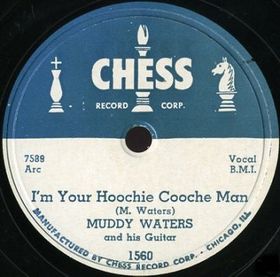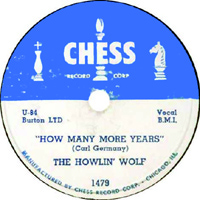
William James Dixon was an American blues musician, vocalist, songwriter, arranger and record producer. He was proficient in playing both the upright bass and the guitar, and sang with a distinctive voice, but he is perhaps best known as one of the most prolific songwriters of his time. Next to Muddy Waters, Dixon is recognized as the most influential person in shaping the post–World War II sound of the Chicago blues.

Chess Records was an American record company established in 1950 in Chicago, specializing in blues and rhythm and blues. It was the successor to Aristocrat Records, founded in 1947. It expanded into soul music, gospel music, early rock and roll, and jazz and comedy recordings, released on the Chess and its subsidiary labels Checker and Argo/Cadet. The Chess catalogue is owned by Universal Music Group and managed by Geffen Records and Universal Music Enterprises.
The story of Tennessee's contribution to American music is essentially the story of three cities: Nashville, Memphis, and Bristol. While Nashville is most famous for its status as the long-time capital of country music, Bristol is recognized as the "Birthplace of Country Music". Memphis musicians have had an enormous influence on blues, early rock and roll, R&B, and soul music, as well as an increasing presence in rap.

Rufus C. Thomas, Jr. was an American rhythm-and-blues, funk, soul and blues singer, songwriter, dancer, DJ and comic entertainer from Memphis, Tennessee. He recorded for several labels, including Chess Records and Sun Records in the 1950s, before becoming established in the 1960s and 1970s at Stax Records. His dance records, including "Walking the Dog" (1963), "Do the Funky Chicken" (1969), and "(Do the) Push and Pull" (1970), were some of his most successful songs. According to the Mississippi Blues Commission, "Rufus Thomas embodied the spirit of Memphis music perhaps more than any other artist, and from the early 1940s until his death . . . occupied many important roles in the local scene."

Marion Walter Jacobs, known as Little Walter, was an American blues musician, singer, and songwriter, whose revolutionary approach to the harmonica had a strong impact on succeeding generations, earning him comparisons to such seminal artists as Django Reinhardt, Charlie Parker and Jimi Hendrix. His virtuosity and musical innovations fundamentally altered many listeners' expectations of what was possible on blues harmonica. He was inducted into The Rock and Roll Hall of Fame in 2008, the first and, to date, only artist to be inducted specifically as a harmonica player.

James Milton Campbell Jr., better known as Little Milton, was an American blues singer and guitarist, best known for his number-one R&B single "We're Gonna Make It". His other hits include "Baby, I Love You", "Who's Cheating Who?", and "Grits Ain't Groceries ".

J. B. Lenoir was an American blues guitarist and singer-songwriter, active in the Chicago blues scene in the 1950s and 1960s.

Edward Riley Boyd was an American blues pianist, singer and songwriter, best known for his recordings in the early 1950s, including the number one R&B chart hit "Five Long Years".

"Goin' Down Slow" or "Going Down Slow" is a blues song composed by American blues singer St. Louis Jimmy Oden. It is considered a blues standard and "one of the most famous blues of all".

"Hoochie Coochie Man" is a blues standard written by Willie Dixon and first recorded by Muddy Waters in 1954. The song makes reference to hoodoo folk magic elements and makes novel use of a stop-time musical arrangement. It became one of Waters' most popular and identifiable songs and helped secure Dixon's role as Chess Records' chief songwriter.

William Robert Emerson, known during his recording career as Billy "The Kid" Emerson and more recently as Rev. William R. Emerson, was an American R&B and rock and roll singer and songwriter turned preacher, best known for his 1955 song, "Red Hot."
"The Seventh Son" is a rhythm and blues song written by Willie Dixon. The title refers to the seventh son of a seventh son of folklore, which Dixon referenced previously in his "Hoochie Coochie Man". The lyrics include:

"My Babe" is a Chicago blues song and a blues standard written by Willie Dixon for Little Walter. Released in 1955 on Checker Records, a subsidiary of Chess Records, the song was the only Dixon composition ever to become a number one R&B single and it was one of the biggest hits of either of their careers.
"I Don't Know" is a rhythm and blues song recorded in October 1952 by Willie Mabon and His Combo. Mabon is credited as the songwriter, although blues historian Gerard Herzhaft notes that it was "inspired by Cripple Clarence Lofton".

His Best is a greatest hits album by Chicago blues harmonica player Little Walter, released on June 17, 1997 by MCA and Chess Records as a part of The Chess 50th Anniversary Collection. The album is seen as the CD successor to the 1958 The Best of Little Walter and features ten of the songs from that album.

"You Don't Love Me" is a rhythm and blues-influenced blues song recorded by American musician Willie Cobbs in 1960. Adapted from Bo Diddley's 1955 song "She's Fine She's Mine", it is Cobbs' best-known song and features a guitar figure and melody that has appealed to musicians in several genres.

"Don't Start Me Talkin'" is a blues song written and performed by Sonny Boy Williamson II. It was Williamson's first single recorded for Checker Records, and reached number three in the US Billboard R&B chart in 1955.

"How Many More Years" is a blues song written and originally recorded by Howlin' Wolf in 1951. Recorded at the Memphis Recording Service – which later became the Sun Studio – it was released by Chess Records and reached No. 4 on the Billboard R&B chart. Musician and record producer T Bone Burnett has described "How Many More Years" as "in some ways ... the first rock’n’roll song". It was a double-sided hit with "Moanin' at Midnight", which reached No. 10 on the R&B chart.

"Moanin' at Midnight" is a blues song written and recorded by Howlin' Wolf in 1951. The recording was released on Chess Records as his debut single. It charted on Billboard's R&B chart, but the B-side, "How Many More Years," became the popular side of the record.
Augustus D. "Gus" Jenkins was an American blues and R&B pianist, vocalist and bandleader. Credited as Gus Jinkins, he had a no.2 hit on the Billboard R&B chart in 1956 with the instrumental "Tricky". He sometimes used the stage names The Young Wolf, Little Temple, and Piano Bo, and from the late 1960s took the name Jaarone Pharoah.
















